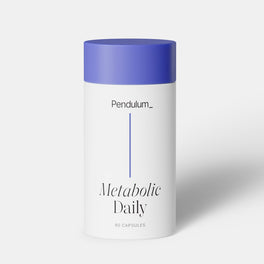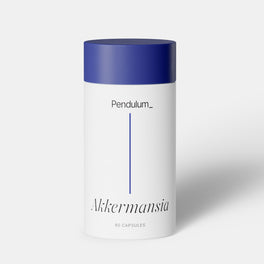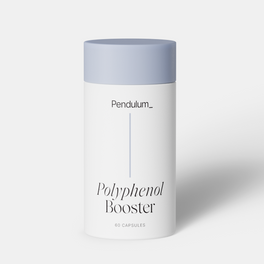Looks like your
cart is empty

Metabolic Daily
Improve metabolism

Akkermansia
Improves gut health

Polyphenol Booster
Increase antioxidants to protect cells
Stay in touch about special discounts, nutrition tips and additional education.
Looks like your
cart is empty

Improve metabolism

Improves gut health

Increase antioxidants to protect cells
There’s no denying that stress can wreak havoc on the gut. We’ve all felt it—whether it’s a high-stakes week at work, back-to-back travel, recovering from illness, or just too many meals eaten on the go. The bottom line: when we’re stressed, our gut feels it too.
The gut and brain have a deeply interconnected relationship, constantly sending signals back and forth to each other through what’s known as the gut-brain axis. This communication system regulates critical processes in the body, including hormone production, neuronal activity, and the balance of gut microbiota.
When stress levels rise, the gut responds in several ways:
Reduced microbial diversity and dysbiosis – Chronic stress can disrupt the balance of beneficial and harmful bacteria in the gut, leading to imbalances that may contribute to digestive discomfort, inflammation, and even mental health issues like anxiety and depression.
Increased intestinal permeability (aka leaky gut) – High stress levels weaken the gut lining, making it more permeable. This allows harmful microbes and toxins to escape into the bloodstream, potentially triggering systemic inflammation and increasing the risk of autoimmune conditions such as IBD, celiac disease, and type 1 diabetes.
Changes in eating habits – Stress often influences dietary choices, leading people to opt for processed, sugary, and refined carbohydrate comfort foods. These foods can promote inflammation and further disrupt gut health, creating a vicious cycle of gut imbalance and stress.
When it comes to your diet, think of food as fuel for both your gut and mind. Filling your plate with balanced, nutrient-rich meals helps keep your microbiome thriving and supports your overall well-being.
Eat the rainbow – Incorporate a diverse range of colorful fruits and vegetables to nourish keystone gut bacteria like Akkermansia muciniphila. Dark leafy greens, red and blue berries, and bright orange root vegetables provide essential antioxidants and polyphenols that help our gut flourish.
Use gut-friendly herbs and spices – Turmeric, ginger, garlic, oregano, black pepper, and cinnamon contain powerful anti-inflammatory and antimicrobial properties that support digestion and overall gut health.
Include probiotic and prebiotic foods – Fermented foods like yogurt, kimchi, sauerkraut, and miso introduce beneficial bacteria to the gut, while prebiotic-rich foods like onions, garlic, bananas, and asparagus help feed these healthy microbes.
Prioritize healthy fats – Omega-3 fatty acids from sources like salmon, flaxseeds, and walnuts can help reduce inflammation and support brain function.
Stay hydrated – Drinking plenty of water is essential for digestion and maintaining a healthy microbiome. Herbal teas like chamomile and peppermint can also soothe digestive discomfort, while Ashwagandha has been shown to reduce cortisol levels and anxiety.
While avoiding all stress is highly unlikely, adopting stress management techniques can help mitigate its impact on your health.
Move regularly — Exercise supports gut health by increasing microbial diversity and reducing inflammation. Aim for a mix of movement, including walking, yoga, strength training, or whatever feels good for your body.
Practice mindfulness — Activities like meditation, deep breathing, and journaling can help reduce stress and support a healthier gut-brain connection.
Set boundaries — Learning to say no, prioritizing self-care, and limiting exposure to stressful environments can protect both mental and physical well-being.
Protect your bedtime routine — Your body needs time to rest and digest. Sleep is essential for gut repair and overall health. Establish a consistent sleep schedule, keep your bedroom cool and dark, and replace screentime with reading or journaling.
Your gut and brain are always chatting, which means your food choices, stress levels, and daily habits all impact your gut health. By eating nourishing foods, finding ways to manage stress, and making small gut-friendly changes, you can build a stronger, healthier mind and microbiome.